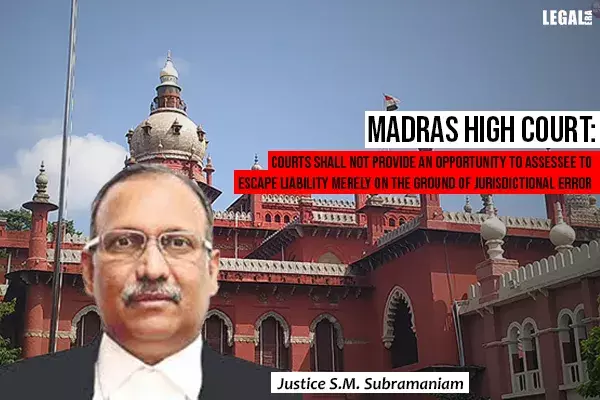Madras High Court: Courts shall not provide an opportunity to assessee to escape liability merely on the ground of jurisdictional error
The Madras High Court (HC) in the case titled M/s Sri Sathya Jewelry (Petitioner) v. The Principal Commissioner of Customs;

Madras High Court: Courts shall not provide an opportunity to assessee to escape liability merely on the ground of jurisdictional error The Madras High Court (HC) in the case titled M/s Sri Sathya Jewelry (Petitioner) v. The Principal Commissioner of Customs (Respondent) ordered the petitioners to approach the Customs, Excises, Appellate Tribunal (CESTAT) and said that the Courts must...
Madras High Court: Courts shall not provide an opportunity to assessee to escape liability merely on the ground of jurisdictional error
The Madras High Court (HC) in the case titled M/s Sri Sathya Jewelry (Petitioner) v. The Principal Commissioner of Customs (Respondent) ordered the petitioners to approach the Customs, Excises, Appellate Tribunal (CESTAT) and said that the Courts must not provide an unnecessary opportunity to the assessee to escape from liability merely on jurisdictional error.
The HC single-judge Justice S.M. Subramaniam noted that a large number of writ petitions are filed without exhausting the statutory appeal remedies and the HC is also routinely entertaining such writ petitions.
In the instant matter the primary ground of contention was that the show cause notice (SCN) was issued by an incompetent authority, not having jurisdiction under the provisions of the Customs Act, 1962, and therefore, the entire proceedings are liable to be set aside.
It was contended that the SCN was issued by the improper authority and it was highlighted that the language employed in the Statute is "The Proper Officer" and it means that such authority is empowered to issue show cause notice, and neither the higher authority nor any other authority has jurisdiction to issue any further orders regarding review or otherwise.
It was further contended that the original authority in certain cases is Appraisers or Assistant Commissioners or Deputy Commissioners of Customs. However, the reassessment has been undertaken by the Customs and the show cause notices were issued by the Directorate of Revenue Intelligence in some cases, and in other cases, Special Investigation Intelligence Branch for Customs.
Hence, it was stated that the Directorate of Revenue Intelligence is not the proper authority as contemplated under Section 28(4) of the Customs Act. Keeping such writ petitions pending for a long time would cause prejudice to the interest of the assessee also.
The HC said that the statutory provisions regarding the appeal are to be decided at the first instance, enabling the litigants to avail the remedy by following the procedures as contemplated under law. Such writ petitions filed may be on the ground of jurisdiction or otherwise.
It added that the Courts are expected to ensure that all such legal grounds available to the parties are adjudicated before the proper Forum and only after exhausting the statutory remedies, writ petitions are to be entertained.
The HC stated that "In the absence of exhausting such remedies, High Court is losing the benefit of deciding the matter on merits as the High Court cannot conduct a trial or examine the original records in the writ proceedings under Article 226 of the Constitution of India."
According to the Court, "Powers of the High Court under Article 226 of the Constitution of India cannot be extended nor widened so as to allow lay hands on the facts and circumstances by conducting the trial, nor certain facts and circumstances with reference to documents and evidences can be assumed or presumed or inference can be drawn, which is not preferable."
It further held, "Jurisdictional error should not result in exoneration of liability. Jurisdictional error, if any committed, is technical, and thus, rectifiable. In such circumstances, the Courts are expected to quash the order passed by an incompetent authority and remand the matter back for fresh adjudication. Contrarily, if an assessee is exonerated from liability, undoubtedly, the purpose and object of the Customs Act, 1962 is defeated."
Justice Subramaniam further said that the Court shall not provide an unnecessary opportunity to the assessee to escape from the liability merely on the ground of jurisdictional error, which is rectifiable.
It held that the petitioners are at liberty to approach the appellate authority and file an appeal by following the procedures contemplated and by complying with the conditions to prefer the appeal, within 60 days from the date of receipt of a copy of this order.
It further said that in the event of filing of appeal(s) by the writ petitioners within 60 days, all such appeals are directed to be entertained without reference to the period of limitation, and the matters are to be adjudicated on merits and by law and by allowing all the parties, and the appeals are to be disposed of as expeditiously as possible.





